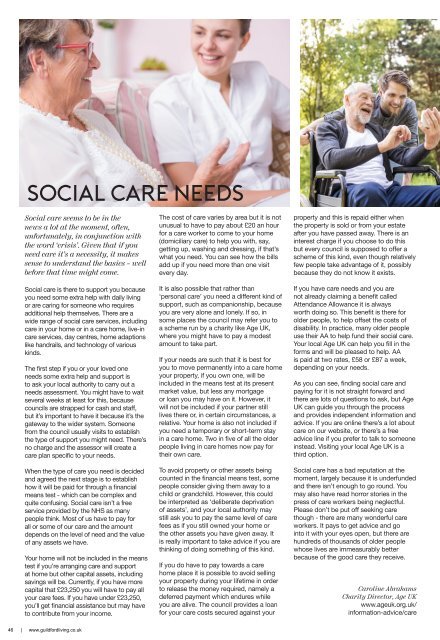Guildford Living Feb - Mar 2020
The Early Spring edition, featuring an interview with top chef Mitch Tonks, fabulous home inspiration, delicious recipes, travel to Santa Barbara and Victorian home renovations.
The Early Spring edition, featuring an interview with top chef Mitch Tonks, fabulous home inspiration, delicious recipes, travel to Santa Barbara and Victorian home renovations.
Create successful ePaper yourself
Turn your PDF publications into a flip-book with our unique Google optimized e-Paper software.
social care needs<br />
Social care seems to be in the<br />
news a lot at the moment, often,<br />
unfortunately, in conjunction with<br />
the word ‘crisis’. Given that if you<br />
need care it’s a necessity, it makes<br />
sense to understand the basics – well<br />
before that time might come.<br />
Social care is there to support you because<br />
you need some extra help with daily living<br />
or are caring for someone who requires<br />
additional help themselves. There are a<br />
wide range of social care services, including<br />
care in your home or in a care home, live-in<br />
care services, day centres, home adaptions<br />
like handrails, and technology of various<br />
kinds.<br />
The first step if you or your loved one<br />
needs some extra help and support is<br />
to ask your local authority to carry out a<br />
needs assessment. You might have to wait<br />
several weeks at least for this, because<br />
councils are strapped for cash and staff,<br />
but it’s important to have it because it’s the<br />
gateway to the wider system. Someone<br />
from the council usually visits to establish<br />
the type of support you might need. There’s<br />
no charge and the assessor will create a<br />
care plan specific to your needs.<br />
When the type of care you need is decided<br />
and agreed the next stage is to establish<br />
how it will be paid for through a financial<br />
means test - which can be complex and<br />
quite confusing. Social care isn’t a free<br />
service provided by the NHS as many<br />
people think. Most of us have to pay for<br />
all or some of our care and the amount<br />
depends on the level of need and the value<br />
of any assets we have.<br />
Your home will not be included in the means<br />
test if you’re arranging care and support<br />
at home but other capital assets, including<br />
savings will be. Currently, if you have more<br />
capital that £23,250 you will have to pay all<br />
your care fees. If you have under £23,250,<br />
you’ll get financial assistance but may have<br />
to contribute from your income.<br />
The cost of care varies by area but it is not<br />
unusual to have to pay about £20 an hour<br />
for a care worker to come to your home<br />
(domiciliary care) to help you with, say,<br />
getting up, washing and dressing, if that’s<br />
what you need. You can see how the bills<br />
add up if you need more than one visit<br />
every day.<br />
It is also possible that rather than<br />
‘personal care’ you need a different kind of<br />
support, such as companionship, because<br />
you are very alone and lonely. If so, in<br />
some places the council may refer you to<br />
a scheme run by a charity like Age UK,<br />
where you might have to pay a modest<br />
amount to take part.<br />
If your needs are such that it is best for<br />
you to move permanently into a care home<br />
your property, if you own one, will be<br />
included in the means test at its present<br />
market value, but less any mortgage<br />
or loan you may have on it. However, it<br />
will not be included if your partner still<br />
lives there or, in certain circumstances, a<br />
relative. Your home is also not included if<br />
you need a temporary or short-term stay<br />
in a care home. Two in five of all the older<br />
people living in care homes now pay for<br />
their own care.<br />
To avoid property or other assets being<br />
counted in the financial means test, some<br />
people consider giving them away to a<br />
child or grandchild. However, this could<br />
be interpreted as ‘deliberate deprivation<br />
of assets’, and your local authority may<br />
still ask you to pay the same level of care<br />
fees as if you still owned your home or<br />
the other assets you have given away. It<br />
is really important to take advice if you are<br />
thinking of doing something of this kind.<br />
If you do have to pay towards a care<br />
home place it is possible to avoid selling<br />
your property during your lifetime in order<br />
to release the money required, namely a<br />
deferred payment which endures while<br />
you are alive. The council provides a loan<br />
for your care costs secured against your<br />
property and this is repaid either when<br />
the property is sold or from your estate<br />
after you have passed away. There is an<br />
interest charge if you choose to do this<br />
but every council is supposed to offer a<br />
scheme of this kind, even though relatively<br />
few people take advantage of it, possibly<br />
because they do not know it exists.<br />
If you have care needs and you are<br />
not already claiming a benefit called<br />
Attendance Allowance it is always<br />
worth doing so. This benefit is there for<br />
older people, to help offset the costs of<br />
disability. In practice, many older people<br />
use their AA to help fund their social care.<br />
Your local Age UK can help you fill in the<br />
forms and will be pleased to help. AA<br />
is paid at two rates, £58 or £87 a week,<br />
depending on your needs.<br />
As you can see, finding social care and<br />
paying for it is not straight forward and<br />
there are lots of questions to ask, but Age<br />
UK can guide you through the process<br />
and provides independent information and<br />
advice. If you are online there’s a lot about<br />
care on our website, or there’s a free<br />
advice line if you prefer to talk to someone<br />
instead. Visiting your local Age UK is a<br />
third option.<br />
Social care has a bad reputation at the<br />
moment, largely because it is underfunded<br />
and there isn’t enough to go round. You<br />
may also have read horror stories in the<br />
press of care workers being neglectful.<br />
Please don’t be put off seeking care<br />
though - there are many wonderful care<br />
workers. It pays to get advice and go<br />
into it with your eyes open, but there are<br />
hundreds of thousands of older people<br />
whose lives are immeasurably better<br />
because of the good care they receive.<br />
Caroline Abrahams<br />
Charity Director, Age UK<br />
www.ageuk.org.uk/<br />
information-advice/care<br />
46 | www.guildfordliving.co.uk


















